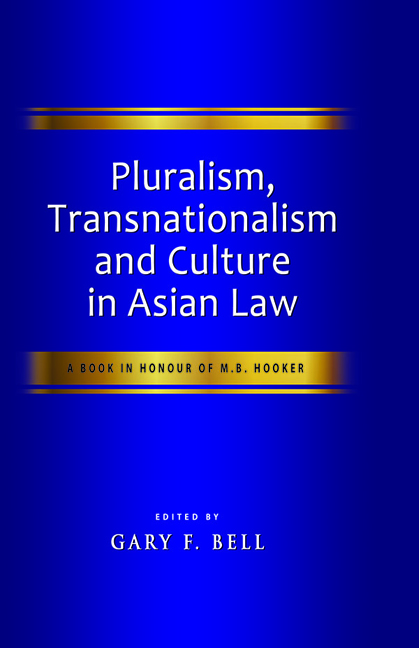Book contents
- Frontmatter
- Dedication
- Contents
- Preface
- Acknowledgements
- About the Contributors
- Chapter 1 M.B. Hooker and Southeast Asian Law: Path-breaking Passions
- Chapter 2 Asian Thought and Legal Diversity
- Chapter 3 Comparative Law, Anti-Essentialism and Intersectionality: Reflections from Southeast Asia in Search of an Elusive Balance
- Chapter 4 Legal Pluralism and Legal Anthropology: Experiences from Indonesia
- Chapter 5 Mapping the Relationship of Competing Legal Traditions in the Era of Transnationalism in Indonesia
- Chapter 6 Indonesia's Weak State Courts and Weak Law Fare Poorly in a Pluralist Commercial World
- Chapter 7 When Laws Are Not Enough: Ethics, Aesthetics, and Intra-Religious Pluralism in Contemporary Indonesia
- Chapter 8 Legal Pluralism and the Constitutional Position of East Malaysia's Indigenous Peoples: The View from the Longhouse
- Chapter 9 Sharia, State and Legal Pluralism in Indonesia: How Law Can You Go?
- Chapter 10 Negotiating Legal Pluralism in Court: Fatwa and the Crime of Blasphemy in Indonesia
- Chapter 11 Islamic Law in Israel: A Case Study in Legal Pluralism
- Chapter 12 The Road to Democracy Goes Through Religious Pluralism: The Indonesian Case and Thoughts on Post-Mubarak Egypt
Chapter 11 - Islamic Law in Israel: A Case Study in Legal Pluralism
Published online by Cambridge University Press: 12 January 2018
- Frontmatter
- Dedication
- Contents
- Preface
- Acknowledgements
- About the Contributors
- Chapter 1 M.B. Hooker and Southeast Asian Law: Path-breaking Passions
- Chapter 2 Asian Thought and Legal Diversity
- Chapter 3 Comparative Law, Anti-Essentialism and Intersectionality: Reflections from Southeast Asia in Search of an Elusive Balance
- Chapter 4 Legal Pluralism and Legal Anthropology: Experiences from Indonesia
- Chapter 5 Mapping the Relationship of Competing Legal Traditions in the Era of Transnationalism in Indonesia
- Chapter 6 Indonesia's Weak State Courts and Weak Law Fare Poorly in a Pluralist Commercial World
- Chapter 7 When Laws Are Not Enough: Ethics, Aesthetics, and Intra-Religious Pluralism in Contemporary Indonesia
- Chapter 8 Legal Pluralism and the Constitutional Position of East Malaysia's Indigenous Peoples: The View from the Longhouse
- Chapter 9 Sharia, State and Legal Pluralism in Indonesia: How Law Can You Go?
- Chapter 10 Negotiating Legal Pluralism in Court: Fatwa and the Crime of Blasphemy in Indonesia
- Chapter 11 Islamic Law in Israel: A Case Study in Legal Pluralism
- Chapter 12 The Road to Democracy Goes Through Religious Pluralism: The Indonesian Case and Thoughts on Post-Mubarak Egypt
Summary
In his article “Legal Pluralism and the Study of Sharīʿa Courts”, Ido Shahar presents several historical instances of legal pluralism and concludes by saying that “the time has come for a systematic assessment of the relevancy of a legal pluralistic perspective for the study of the sharīʿa courts”. He, moreover, comes forward with specific suggestions for future research. Shahar is concerned with legal pluralism as a theme in the sociology and anthropology of law in addition to considering it as an issue for legal theory. The purpose of the present study is to provide the reader with a general outline of the status of the sharīʿa within the Israeli legal system and its application in sharʿī, civil and tribal judiciaries. Some of the issues discussed here have already been dealt with within the context of legal history. In what follows, an attempt is made to present them in the context of legal pluralism.
Israel is a unique case of legal pluralism due to its unique legal history. With the collapse of the Ottoman Empire at the end of World War I and the occupation of Palestine by Britain, the country ceased to be part of a Muslim state, with all the legal consequences that involved, though the millet system as part of the Ottoman Muslim legal heritage — consisting of communal organization and autonomous religious courts — has survived, while adapting itself to the new political circumstances. With the emergence of the State of Israel, the Muslim community became a religious minority in a Jewish democratic state. The Muslim Supreme Council, established by the British Mandate in 1921 with a view to compensating the Muslim community for the lack of Islamic sovereignty, ceased to exist, and with it collapsed the entire Muslim establishment, including sharīʿa courts and the waqf administration. The religious elite left the country during the events that preceded the emergence of the state.
The new sharʿī judiciary in Israel has been integrated into the general judicial system. In 2002 it was subordinated to the Ministry of Justice instead of the Ministry for Religious Affairs.
- Type
- Chapter
- Information
- Pluralism, Transnationalism and Culture in Asian LawA Book in Honour of M.B. Hooker, pp. 257 - 292Publisher: ISEAS–Yusof Ishak InstitutePrint publication year: 2017

